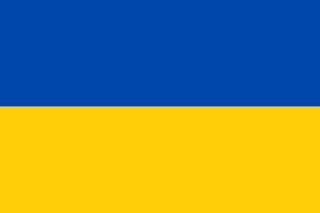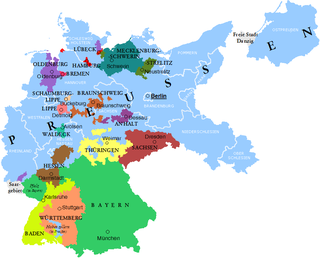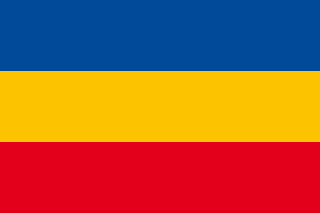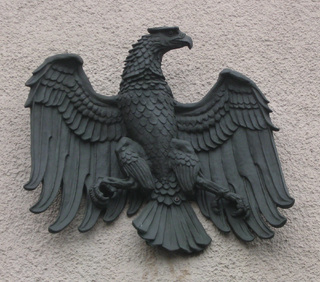In the fourteen years the Weimar Republic was in existence, some forty parties were represented in the Reichstag. This fragmentation of political power was in part due to the use of a peculiar proportional representation electoral system that encouraged regional or small special interest parties and in part due to the many challenges facing the nascent German democracy in this period.

The Landtag of Saxony, also known in English as the Saxon State Parliament, is the legislature of the Free State of Saxony, one of Germany's sixteen states. It is responsible for legislation, control of the government, and electing some state officials. The Landtag has existed in various forms since 1831, but the current body was established during German reunification in 1990. The Landtag is directly elected and has a term of five years.

The Free State of Brunswick was a state of the German Reich in the time of the Weimar Republic. It was formed after the abolition of the Duchy of Brunswick in the course of the German revolution of 1918–1919. Its capital was Braunschweig (Brunswick). In 1933 it was de facto abolished by Nazi Germany. The free state was disestablished after the Second World War in November 1946.

Landtag elections in the Free State of Bavaria (Freistaat Bayern) during the Weimar Republic were held at irregular intervals between 1919 and 1932. Results with regard to the total vote, the percentage of the vote won, the number of seats allocated to each party and the change in distribution of seats are presented in the tables below. On 31 March 1933, the sitting Landtag was dissolved by the Nazi-controlled central government and reconstituted to reflect the distribution of seats in the national Reichstag. The Landtag subsequently was formally abolished as a result of the "Law on the Reconstruction of the Reich" of 30 January 1934 which replaced the German federal system with a unitary state.

Landtag elections in the Free State of Saxony (Freistaat Sachsen) during the Weimar Republic were held at irregular intervals between 1919 and 1930. Results with regard to the percentage of the vote won and the number of seats allocated to each party are presented in the tables below. On 31 March 1933, the sitting Landtag was dissolved by the Nazi-controlled central government and reconstituted to reflect the distribution of seats in the national Reichstag. The Landtag subsequently was formally abolished as a result of the "Law on the Reconstruction of the Reich" of 30 January 1934 which replaced the German federal system with a unitary state.

Landtag elections in the Free State of Brunswick (Freistaat Braunschweig) during the Weimar Republic were held at two-year, later three-year, intervals between 1918 and 1930. Results with regard to the total vote, the percentage of the vote won and the number of seats allocated to each party are presented in the tables below. On 31 March 1933, the sitting Landtag was dissolved by the Nazi-controlled central government and reconstituted to reflect the distribution of seats in the national Reichstag. The Landtag subsequently was formally abolished as a result of the "Law on the Reconstruction of the Reich" of 30 January 1934 which replaced the German federal system with a unitary state.

The Free State of Schaumburg-Lippe was created following the abdication of Prince Adolf II of the Principality of Schaumburg-Lippe on 15 November 1918, following the German Revolution. It was a state in Germany during the Weimar Republic and Nazi Germany. The democratic government was suppressed during Nazi rule. At the end of the Second World War, the British military occupation government decreed on 1 November 1946 the union of Schaumburg-Lippe, Hannover, Braunschweig and Oldenburg to form the new state of Lower Saxony.

The Free State of Mecklenburg-Schwerin was a state in the Weimar Republic that was established on 14 November 1918 upon the abdication of the Grand Duke of Mecklenburg-Schwerin following the German Revolution. In 1933, after the onset of Nazi rule, it was united with the smaller neighbouring Free State of Mecklenburg-Strelitz to form the new united state of Mecklenburg on 1 January 1934.

The Prussian Constitution of 1920 formed the legal framework for the Free State of Prussia, a constituent state of the Weimar Republic, from 1918 to 1947. It was based on democratic parliamentary principles and replaced the Constitution of 1848/50. During the National Socialist era, it was eroded to the point of irrelevance and following World War II lost legal force when the state of Prussia was abolished by the Allies in 1947.

State elections were held in the Free State of Prussia on 20 February 1921 to elect 406 of the 428 members of the Landtag of Prussia. The governing coalition of the Social Democratic Party, Centre Party, and German Democratic Party suffered major losses, losing one-third of its collective voteshare from 1919, but retained a narrow majority. The right-liberal German People's Party (DVP) and reactionary nationalist German National People's Party (DNVP) made the largest gains, with the DNVP becoming the second largest party by voteshare. The Communist Party of Germany contested its first Prussian election, winning 31 seats.

Landtag elections in the Free State of Thuringia (Freistaat Thüringen) during the Weimar Republic were held at irregular intervals between 1920 and 1932. Results with regard to the total vote, the percentage of the vote won and the number of seats allocated to each party are presented in the tables below. On 31 March 1933, the sitting Landtag was dissolved by the Nazi-controlled central government and reconstituted to reflect the distribution of seats in the national Reichstag. The Landtag subsequently was formally abolished as a result of the "Law on the Reconstruction of the Reich" of 30 January 1934 which replaced the German federal system with a unitary state.

Landtag elections in the Free State of Mecklenburg-Schwerin (Freistaat Mecklenburg-Schwerin) during the Weimar Republic were held at irregular intervals between 1919 and 1932. Results with regard to the total vote, the percentage of the vote won and the number of seats allocated to each party are presented in the tables below. On 31 March 1933, the sitting Landtag was dissolved by the Nazi-controlled central government and reconstituted to reflect the distribution of seats in the national Reichstag. The Landtag subsequently was formally abolished as a result of the "Law on the Reconstruction of the Reich" of 30 January 1934 which replaced the German federal system with a unitary state.
Landtag elections in the Free State of Mecklenburg-Strelitz (Freistaat Mecklenburg-Strelitz) during the Weimar Republic were held at irregular intervals between 1918 and 1932. Results with regard to the total vote, the percentage of the vote won and the number of seats allocated to each party are presented in the tables below. On 31 March 1933, the sitting Landtag was dissolved by the Nazi-controlled central government and reconstituted to reflect the distribution of seats in the national Reichstag. The Landtag subsequently was formally abolished as a result of the "Law on the Reconstruction of the Reich" of 30 January 1934 which replaced the German federal system with a unitary state.

Landtag elections in the Free State of Oldenburg (Freistaat Oldenburg) during the Weimar Republic were held at irregular intervals between 1919 and 1932. Results with regard to the total vote, the percentage of the vote won and the number of seats allocated to each party are presented in the tables below. On 31 March 1933, the sitting Landtag was dissolved by the Nazi-controlled central government and reconstituted to reflect the distribution of seats in the national Reichstag. The Landtag subsequently was formally abolished as a result of the "Law on the Reconstruction of the Reich" of 30 January 1934 which replaced the German federal system with a unitary state.

Landtag elections in the Free State of Anhalt (Freistaat Anhalt) during the Weimar Republic were held at irregular intervals between 1918 and 1932. Results with regard to the total vote, the percentage of the vote won and the number of seats allocated to each party are presented in the tables below. On 31 March 1933, the sitting Landtag was dissolved by the Nazi-controlled central government and reconstituted to reflect the distribution of seats in the national Reichstag. The Landtag subsequently was formally abolished as a result of the "Law on the Reconstruction of the Reich" of 30 January 1934 which replaced the German federal system with a unitary state.

Landtag elections in the Free State of Lippe (Freistaat Lippe) during the Weimar Republic were held at irregular intervals between 1919 and 1933. Results with regard to the total vote, the percentage of the vote won and the number of seats allocated to each party are presented in the tables below. On 31 March 1933, the sitting Landtag was dissolved by the Nazi-controlled central government and reconstituted to reflect the distribution of seats in the national Reichstag. The Landtag subsequently was formally abolished as a result of the "Law on the Reconstruction of the Reich" of 30 January 1934 which replaced the German federal system with a unitary state.
Landtag elections in the Free State of Schaumburg-Lippe (Freistaat Schaumburg-Lippe) during the Weimar Republic were held at 3-year intervals between 1919 and 1931. Results with regard to the total vote, the percentage of the vote won and the number of seats allocated to each party are presented in the tables below. On 31 March 1933, the sitting Landtag was dissolved by the Nazi-controlled central government and reconstituted to reflect the distribution of seats in the national Reichstag. The Landtag subsequently was formally abolished as a result of the "Law on the Reconstruction of the Reich" of 30 January 1934 which replaced the German federal system with a unitary state.
The 1918 Brunswick state election was held on 22 December 1918 to elect the 60 members of the Landtag of the Free State of Brunswick.
The 1922 Brunswick state election was held on 22 January 1922 to elect the 60 members of the Landtag of the Free State of Brunswick.

Anton Leonhard Franzen was a German lawyer and politician of the Nazi Party. On 1 October 1930, he became the first Nazi to serve as a state government minister in the Free State of Brunswick. During his tenure as Minister of the Interior and Public Education, he attempted to remove the Party's political opponents and to pack the police and educational systems with Nazis. He resigned on 27 July 1931 and left politics, returning to the practice of law.








